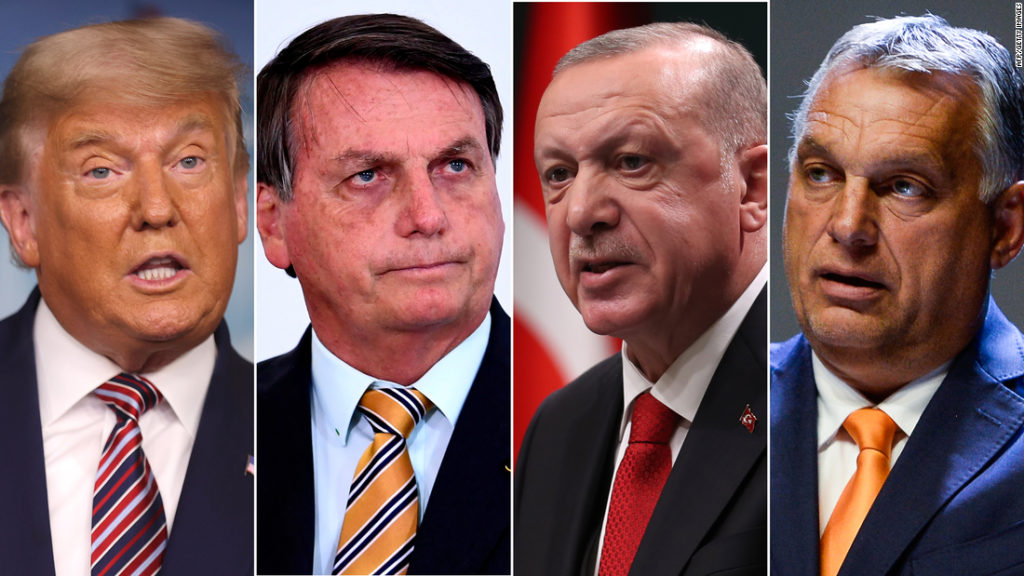But that doesn’t necessarily mean the populist wave has crested — not in the United States, nor the world at large.
If support for populism has eroded in the US, it has done so only marginally, and the same can be said for much of the world.
Brazil and India — which, like the US, have populist leaders — might be suffering with soaring infection and death rates, but so too is Western Europe, a bastion for liberal democracy. Even Germany, earlier celebrated for what looked like a model response to the virus, is finding its huge hospital network under strain as it struggles to keep the virus at bay.
Several autocratic populists saw their approval ratings dive in the midst of the pandemic, but many have recovered remarkably fast.
“Populist movements come from long-term cultural shifts, so you wouldn’t necessarily expect them to fade away, even if the brand’s image gets damaged by losing Trump as its global leader,” Pippa Norris, from Harvard University’s Kennedy School of Government, told CNN.
The current populist wave was triggered by a number of major events, like the 2007-08 financial crisis and the mass movement of refugees into Europe in 2015, which propelled several anti-migration populist parties into parliamentary chambers across the region, Norris said.
“And then we had Brexit in the middle of 2016, and if that hadn’t been held during the refugee crisis, I do think the results could have gone the other way,” she said.
“But we should remember that Trump was both a consequence and a cause of the changes around that time. In Europe, autocratic populism was already rising.”
What’s next?
As Norris points out, populism tends to flourish in times of crisis, particularly of the economic kind.
In Europe, it may be more useful to focus on Biden’s victory, rather than Trump’s loss. Daphne Halikiopoulou from the University of Reading in England said the US election could reinvigorate the left and center-left, which had broadly failed to respond to the 2007-08 financial crisis and “imploded” as a result.
“If Trump had won, there would have been jubilation [among far-right populists], because they could have said, ‘Look, our ideas are mainstream,'” Halikiopoulou said.
“But one signal to take from the US election is that the left can find it again … find an electorally successful recipe.”
In Brazil, municipal elections going on now might offer an insight into how long Brazilians may want to keep populist leaders in power. But their real report will come in 2022, when Bolsonaro is likely to stand for another term.
“Bolsonaro appears to be visibly upset at what has happened in the US because it raises the specter of his own potential electoral failing in his bid for reelection in two years,” said Mark Langevin, director of the consultancy BrazilWorks.
But it seems Bolsonaro may be learning already. He is toning down his public admiration for Trump and taking advice from his team to be less aggressive than his American counterpart, Langevin observes.
“The minister for communications, Fábio Faria, has convinced Bolsonaro to limit his personal communications with the press, and simply travel around Brazil and parade himself with his groupies in all sorts of destinations around Brazil, where he doesn’t really say anything, but is seen eating a pastel [pastry] with local politicians. And that’s been working great for him. Brazilians love that stuff.”
The year 2022 will be populism’s true barometer, not just in Brazil, but in countries like France, where the presidential election could be another race between centrist Macron and far-right populist Le Pen, or Hungary, which will also decide on whether to continue on Orbán’s populist, anti-migration and euroskeptic path or to try something else.
But the US will again be the big one to watch. Americans will have their say in midterm elections, in which they will either reinforce their support for Biden or hand greater powers back to the Republicans, who are unlikely to abandon the populist Trumpism that gave their party new life.
CNN’s Gul Tuysuz and Pierre Bairin contributed to this report.
You may also like
-
Afghanistan: Civilian casualties hit record high amid US withdrawal, UN says
-
How Taiwan is trying to defend against a cyber ‘World War III’
-
Pandemic travel news this week: Quarantine escapes and airplane disguises
-
Why would anyone trust Brexit Britain again?
-
Black fungus: A second crisis is killing survivors of India’s worst Covid wave

